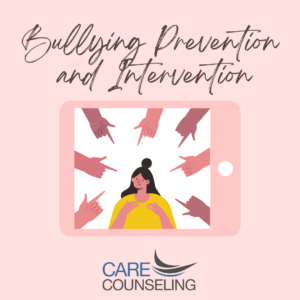Bullying Prevention and Intervention
 In the pursuit of nurturing well-rounded individuals, schools must prioritize a safe and inclusive learning environment. Bullying, a pervasive issue that affects students of all ages, can have far-reaching consequences on victims, perpetrators, and the entire school community. As key advocates for students’ mental and emotional well-being, school counselors play a crucial role in preventing and addressing bullying behaviors. This blog post offers insights and strategies for school counselors to effectively combat bullying, support victims, and guide those who engage in harmful behavior towards a more positive path.
In the pursuit of nurturing well-rounded individuals, schools must prioritize a safe and inclusive learning environment. Bullying, a pervasive issue that affects students of all ages, can have far-reaching consequences on victims, perpetrators, and the entire school community. As key advocates for students’ mental and emotional well-being, school counselors play a crucial role in preventing and addressing bullying behaviors. This blog post offers insights and strategies for school counselors to effectively combat bullying, support victims, and guide those who engage in harmful behavior towards a more positive path.
Understanding Bullying:
Bullying encompasses a range of aggressive behaviors that involve a power imbalance, causing harm or distress to another person. It can manifest in various forms, including verbal, physical, social, or cyberbullying. Identifying these behaviors is a critical first step for school counselors to effectively intervene and create a safe atmosphere for all students.
Bullying Prevention Strategies:
- Promote Awareness: Collaborate with teachers, staff, and administrators to raise awareness about bullying and its negative impacts. Conduct workshops, assemblies, and awareness campaigns to educate students about the consequences of bullying.
- Establish Clear Policies: Work with school administration to develop and communicate clear anti-bullying policies and procedures. Ensure that students, staff, and parents understand the consequences of bullying behaviors.
- Create Safe Reporting Channels: Establish confidential reporting mechanisms where students can report bullying incidents without fear of retaliation. This could include anonymous reporting platforms and regular check-ins with school counselors.
- Educate Students on Bystander Role: Teach students the importance of being active bystanders. Encourage them to speak up and report bullying incidents, fostering a culture of responsibility and empathy.
Intervention Strategies for Victims:
- Provide Supportive Spaces: Create safe spaces within the school where victims can seek support. This could include regular one-on-one sessions with school counselors or participation in support groups.
- Foster Resilience: Empower victims with skills to cope with bullying, such as emotional regulation techniques and strategies for building resilience. Help them recognize their strengths and develop a positive self-image.
- Involve Parents/Guardians: Collaborate with parents or guardians of victims to ensure they are aware of the situation and can provide support at home. Establish open lines of communication to address concerns and monitor progress.
- Advocate for Change: Empower victims to assert their rights and advocate for themselves. Assist them in addressing the issue with school administrators and teachers, and work together to implement necessary changes.
Intervention Strategies for Perpetrators:
- Educate About Consequences: Help perpetrators understand the consequences of their actions on both the victim and themselves. Teach empathy and encourage them to reflect on their behavior.
- Restorative Practices: Implement restorative justice practices that encourage perpetrators to take responsibility for their actions, make amends, and learn from their mistakes.
- Develop Social Skills: Provide guidance on effective communication, conflict resolution, and social skills. Often, those engaging in bullying lack these skills and resort to negative behaviors.
- Channel Negative Energy: Assist perpetrators in finding positive outlets for their emotions and frustrations, such as participating in extracurricular activities or clubs that align with their interests.
Creating Lasting Change:
The role of a school counselor extends beyond individual interventions; it involves fostering a culture of respect, empathy, and inclusion. To create lasting change, consider these additional strategies:
- Whole-School Approach: Collaborate with teachers, administrators, and parents to ensure a consistent approach to bullying prevention. Host workshops and trainings for school staff to enhance their understanding of bullying and intervention strategies.
- Peer Mediation Programs: Implement peer mediation programs where trained students can mediate conflicts and disagreements among their peers, reducing the likelihood of escalating into bullying.
- Character Education Curriculum: Work with educators to integrate character education into the curriculum. Promote values like empathy, kindness, and respect through lessons and activities.
- Celebrate Diversity: Organize events and activities that celebrate diversity and inclusivity. These initiatives can foster a sense of belonging and reduce the occurrence of bullying.
By actively engaging in bullying prevention and intervention, school counselors become advocates for a safe and supportive learning environment. Through education, awareness, and collaboration, they play a pivotal role in empowering students, transforming attitudes, and fostering a culture where every individual is valued and respected.



























